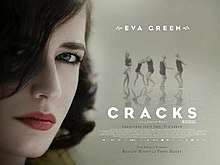Cracks (film)
Cracks is a 2009 British independent psychological thriller drama film directed by Jordan Scott, starring Eva Green, Juno Temple, María Valverde, and Imogen Poots. It was released theatrically in the United Kingdom and Ireland on 4 December 2009. In the United States, it was released by IFC Films theatrically on 18 March 2011[2] and premiered on television on Showtime as part of an ongoing pay television broadcast deal with IFC later in the year.[3]
| Cracks | |
|---|---|
 | |
| Directed by | Jordan Scott |
| Produced by | Kwesi Dickson Andrew Lowe Julie Payne Rosalie Swedlin Christine Vachon |
| Screenplay by | Ben Court Caroline Ip Jordan Scott |
| Based on | Cracks by Sheila Kohler |
| Starring | Eva Green Juno Temple María Valverde Imogen Poots Sinéad Cusack |
| Music by | Javier Navarrete |
| Cinematography | John Mathieson |
| Edited by | Valerio Bonelli |
Production company | |
| Distributed by | Optimum Releasing (UK) Studio Canal (France) IFC Films (US)[1] |
Release date |
|
Running time | 104 minutes |
| Country | United Kingdom Ireland |
| Language | English |
The film was produced in May 2008, written for the screen by Caroline Ip, Ben Court and Jordan Scott, based on the 1999 novel written by Sheila Kohler. Kwesi Dickson, Andrew Lowe, Julie Payne, Rosalie Swedlin and Christine Vachon were the producers. Ridley and Tony Scott served as executive producers.[4] The film was mostly filmed in County Wicklow, Ireland.
Plot
Set in the 1930s in a strict elite British boarding school called St Mathilda's, the story centres on a clique of girls who idolise their enigmatic diving instructor, Miss G (Eva Green) (in the film, we learn that Miss G had been a student at the same school where she now works and may even have continued on at the school after she graduated). Di Radfield (Juno Temple) has a crush on Miss G, and is the firm favourite and ringleader of her group. When a beautiful Spanish girl named Fiamma Corona (María Valverde) arrives at the school, Miss G's focus is shifted away from the other girls. It becomes a triangle: Miss G gets increasingly obsessed with Fiamma, Fiamma is disturbed by Miss G and also openly disgusted by the teacher's hypocrisies and deceptions, and Di is terribly jealous and makes Fiamma's life hell.
In a very telling scene in the film that clearly highlighted Miss G's deceptions, Miss G (who claimed to be a world traveller to her "girls") goes to a nearby parochial town to buy some provisions. She is visibly upset by this trip and after buying her provisions and drawing the unwanted attention of some local louts, she returns to the school in, it would seem, a near panic. The bullying culminates in Di physically throwing Fiamma out of the school but, as she is unable to return to Spain as she hoped, Fiamma ends up back at the school later that night.
When Fiamma is eventually found, the two girls make the first steps towards friendship, and at the following dorm party they all get a bit drunk, and Fiamma faints. Miss G takes her to her own room. Then Miss G kisses her and rapes her while she is passed out; Di witnesses this through the room door, which was left ajar, and then flees.
The next morning, Fiamma is visibly upset, and Miss G is equally distressed as she runs around after her. Di is broody, and eventually tells the rest of her gang that Fiamma seduced Miss G. Fiamma presumably tells Miss G that she will report the molestation to the teachers, and horrified, Miss G realises her career will be over. She in turn manipulates Di's affection for her into anger. She says that Fiamma will make up lies about her molesting her (even though it was true) and plans to get her kicked out of school. Di absolutely refuses to allow this to happen.
The confrontation between Di's gang and Fiamma turns ugly as Fiamma declines to answer Di's vicious questions and tries to explain what really happened, hinting at Miss G's lies and character defects. Fiamma runs into the forest as things become more violent, but the girls catch up with her and, under Di's leadership, beat her with their sticks and fists. Fiamma starts to have an asthma attack, and the girls stop, terrified. They run to get help, and Di runs into Miss G (who had been watching the beating and the chase that ensued quietly and with no attempt to stop the beating), who says she'll stay with Fiamma, and directs Di to go get a teacher.
In the forest, Miss G, alone with Fiamma, refuses to give Fiamma her inhaler and calmly watches her die. Di returns just in time to see Miss G placing the inhaler in Fiamma's lifeless hand, realizing the truth.
Later, Di tells the other girls what happened and, united, they confront Miss G. They are powerless officially, but they quit the diving team and symbolically turn in their sashes. The headmistress refuses to acknowledge the school's culpability, and seems only concerned with the school's reputation, but releases Miss G from her duties.
The final scene has Di leaving the school to explore the world, as both Fiamma and Miss G had spoken of doing, whilst Miss G, fired from the school, goes to the local village and finds a small room she can live in, presumably closing herself away for the rest of her life. In a scene that perhaps allows the viewer a better understanding of Miss G's very complex personality, we see her put her few personal possessions on her bedside table. She puts one item there and then quickly removes it to make room for another item. After that, she counts the items to make sure that there are only five. The viewer is then reminded that when Fiamma arrived at the school, in the dorm room, Di had told her that only five personal items could be displayed on her night table at one time. The audience then realises Miss G is as much a victim of the institutionalised setting she grew up in (she was perhaps like many of the girls at the school "dumped" there and basically forgotten about by her family) as Fiamma was her victim.[5]
Cast

- Eva Green as Miss "G" Gribben
- Juno Temple as Di Radfield
- Maria Valverde as Fiamma Coronna
- Imogen Poots as Poppy
- Zoë Carroll as Rosie
- Ellie Nunn as Lily
- Adele McCann as Laurel
- Clemmie Dugdale as Fuzzy
- Sinéad Cusack as Miss Nieven
- Deirdre Donnelly as Miss Lacey
Reception
Cracks received a mixed reception from critics. It has a score of 43% on Rotten Tomatoes, based on 47 critic reviews.[6] On Metacritic, the film has a score of 54 out of 100 based on 12 critic reviews.[2]
References
- Fischer, Russ (12 November 2009). "IFC Buys Cracks, Debut Film From Jordan Scott". /Film. Archived from the original on 17 February 2010. Retrieved 13 November 2009.
- "Cracks". Metacritic. Retrieved 29 November 2011.
- "Cracks". Movies on Showtime. Archived from the original on 10 September 2012. Retrieved 29 November 2011.
- Rechtshaffen, Michael (14 September 2009). "Cracks – Film Review". The Hollywood Reporter.
- Smith, Krista (August 2009). "Dangerous Lessons". Vanity Fair.
- "Cracks (2011)". Rotten Tomatoes. Retrieved 29 November 2011.
Further reading
- Mellor, Richard (4 December 2009). "Cracks". Eye for Film.
- Millward, Liz; Dodd, Janice G.; Fubara-Manuel, Irene (2017). Killing Off the Lesbians: A Symbolic Annihilation on Film and Television. McFarland & Company. p. 28. ISBN 978-1476668161.
- Reed, Rex (15 March 2011). "Movie Review: Ridley Scott's Daughter Makes a Thrilling, Polarizing Debut With 'Cracks'". Observer.
- Snarker, Doroty (29 October 2009). ""Cracks" reveals a disturbing tale of boarding school obsession". AfterEllen.
External links
- Official website
- Cracks on IMDb
- Cracks at AllMovie
- Cracks at Box Office Mojo
- Cracks at LUMIERE
- Cracks at Rotten Tomatoes